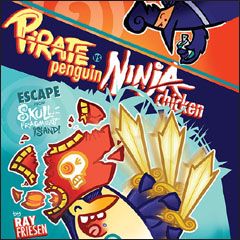Awards | Riad Sattouf's graphic memoir Arab of the Future has won this year's Los Angeles Times Book Prize in the graphic novel category. The first volume of a planned trilogy, Arab of the Future also won top honors at the Angouleme International Comics Festival two years ago. [Los Angeles Times]
Passings | Mark Evanier remembers Leonard Brenner, the production manager and later art director of MAD Magazine from 1958 to 1995: "'The Beard' (that was his nickname) didn't write or draw articles in the same way as most MAD contributors you could name but he touched almost every page between 1958 when he joined the magazine and 1995 when he retired. Aside from publisher William M. Gaines, Lenny's name appeared on MAD's masthead more than anyone else's. His sense of humor and painstaking attention to design and detail were often evident, especially when the staff had to replicate a piece of someone else's advertising or mimic the look and feel of another publication." [News from ME]
Publishing | John Freeman tackles the question of why there aren't more reprints of classic British comics, looking at both the question of whether there is a market and the problem of tracking down the rights to comics whose publishers have gone under or been absorbed by other companies. [Down the Tubes]
Creators | Ronald Wimberly talks about his graphic novel Prince of Cats, which was previously published by Vertigo. The rights reverted Wimberly when the book went out of print, and now he's releasing a new edition through Image Comics. [Sktchd]
Creators | Annie Mok interviews Eleanor Davis, whose recent work includes the all-ages Flop to the Top (for TOON Books) and the short story collection How to Be Happy. [The Comics Journal]
Creators | Roger Langridge is the guest on The Great Big Beautiful Podcast. The second issue of his new comic The Baker Street Peculiars is out this week. [GeekDad]
Creators | Chester Brown discusses his new book, Mary Wept Over the Feet of Jesus, a collection of retellings of Bible stories that revolves around his thesis that Mary, the mother of Jesus, was a prostitute. [Salon]
Creators | I talked with Ray Friesen, whose all-ages graphic novel Pirate Penguin and Ninja Chicken (Book 2): Escape from Skull Fragment Island is out today from Top Shelf. Friesen has been making comics since he was a kid and did his first paid work at the age of 4. [Good Comics for Kids]
Creators | At the age of 11, Amy Tucker of East Kilbirde, Scotland, has already completed and self-published the first issue of her comic, Mystery Club, which won honorable mention in the John Byrne National Drawing Competition. But she's not letting that go to her head—she's already hard at work on the second issue; the first issue has already sold out in her local comic shop and at her school. [Daily Record]
Comics | Chicago-area retailers discuss the new diversity of comics and the new audience that is coming in to buy them. "People of color have been reading comics for a long time, and they've been ignored, and I think that market has ... you need to market to it, and you need to sell to it," says James Nurss, owner of First Aid Comics. [KSHB]
Advice| Victor Van Scoit reports on The Comic Book Women panel at Emerald City Comicon on promoting creator-owned work, which included plenty of concrete talk about building relationships with retailers and promoting yourself on social media. [The Beat]
Webcomics | I wrote an overview piece on webcomics for School Library Journal, concentrating on webcomics as a way for young creators to get started in comics, and also discussing how to find new webcomics to read, which is still a challenge in this resolutely decentralized medium. I included a list of recommended webcomics for kids and teens, and SLJ commissioned a companion webcomic, Economy of Form, by Melanie Gillman, creator of As the Crow Flies. [School Library Journal]
Retailing | Identical twin brothers Frank and Lou Milorey both sell comics at their newsstands in Philadelphia, but the comics aren't new: They're selling off Frank's collection, which once numbered more than 15,000 issues. And they aren't selling them very fast, because the newsstand business isn't what it used to be. Still, it's interesting to hear their perspective, and the photos of their comics-bedecked newsstands have a certain nostalgic charm. [Philly Voice]



